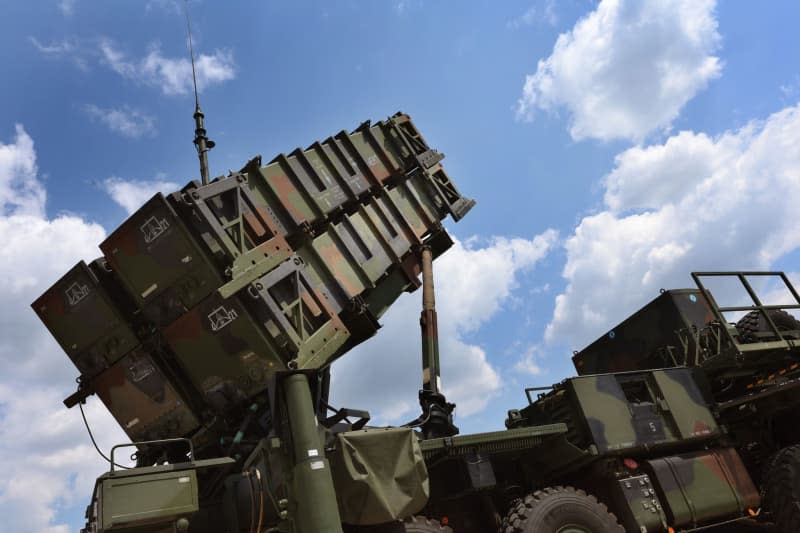Germany to deliver another Patriot system to Ukraine immediately

- Oops!Something went wrong.Please try again later.
The German government is supplying another Patriot air defence system to strengthen Kiev, following months of requests by Ukraine, while a commander in the embattled nation said the situation on the front line was becoming more difficult.
The German air defence system comes from Bundeswehr stocks and is to be handed over immediately, the German Defence Ministry announced in Berlin on Saturday.
So far, Germany has delivered two Patriot systems to Ukraine and the system has proven itself in the fight against Russian aggression, according to the ministry.
Ukrainian President Volodymyr Zelensky thanked German Chancellor Olaf Scholz for the Patriot system and other missiles for the Patriots already in use in Ukraine.
"Thank you, Olaf, for your leadership," he wrote on X, the platform formerly known as Twitter. "This is a real sign of support for Ukraine at a critical time for us."
He also called on the leaders of other countries to follow Germany's example.
Berlin's decision comes after efforts by Defence Minister Boris Pistorius and Foreign Minister Annalena Baerbock to lobby partners for more air defence systems.
Zelensky has been asking for more Patriot defence systems for months in order to better protect the country's airspace against Russian missile and drone attacks.
Scholz also reaffirmed Germany's solidarity with Ukraine in a telephone conversation with Zelensky and discussed ways to further strengthen Ukraine's air defences.
Scholz and Zelensky had agreed that further efforts by partners were necessary, a German government spokesman said. They also discussed a high-level international peace conference on Ukraine in Switzerland in the summer and the Ukraine Reconstruction Conference to be held in Berlin.
Zelensky underlined the importance of Germany in supporting his country as it fends off Russia's invasion.
"Germany's leadership role is really tangible, and thanks to this leadership role we will be able to save thousands of lives and offer Ukraine more protection against Russian terror," Zelensky said in his evening video address.
At the same time, he addressed further words of thanks directly to German Chancellor Olaf Scholz: "Olaf, Mr Chancellor, thank you once again for the air defence."
Zelensky hinted that further arms deliveries had also been discussed during the phone call with Scholz. "We are also working with Germany on an additional IRIS-T system, which is also a powerful air defence system, and on missiles for our existing air defence systems."
On the ground, Ukraine's military highlighted struggles on the front line and called for better technology to help Kiev's forces fend off the Kremlin's attacks.
"The situation on the eastern front has worsened significantly in recent days," Commander-in-Chief Oleksandr Syrskyi wrote on Telegram.
He said that this was due to increased offensive efforts by Russian troops following the election in Russia that handed Putin another term.
The situation around the towns of Lyman, Bakhmut and Pokrovsk in the Donetsk region is particularly sensitive, Syrskyi said. In Pokrovsk in particular, to the west of the town of Avdiivka, which was only captured by the Russians at the beginning of the year, the Russian military is attempting to break through the defence lines using dozens of tanks.
Syrskyi called for the Ukrainian army to be armed with high-tech weapons such as drones. Only with technological innovations would it be possible to equalize the numerical superiority of the Russian attackers.
Meanwhile several people were injured in rocket attacks on the Russian-occupied city of Luhansk.
Russian politician Vladimir Rogov, chairman of the We are Together With Russia movement, wrote on his Telegram channel on Saturday that there were missile strikes near the bus station and a machine-building factory.
Three civilians were injured and several residential buildings were damaged, he said.
Ukrainian media, on the other hand, reported that the attack was aimed at a military unit and a collection of military vehicles near the factory.
Further west, in the small town of Tokmak in the Zaporizhzhya region, which was also captured by the Russians during the war, the death toll has risen to 10 following an attack on Friday.
Two more bodies were found under the rubble of a residential building, the Moscow-appointed governor for the occupied part of the Zaporizhzhya region, Yevgeny Balitsky, announced on Telegram.
Two people were still missing, he wrote, and 18 people were being treated in hospital for their injuries.
Russia has been targeting Ukrainian energy facilities. Against this background, Kiev has started building two more nuclear reactors in the west of the country.
The Interfax-Ukraine news agency reported that the foundation stone for reactor units 5 and 6 of the Khmelnytskyi nuclear power plant was laid in the presence of Energy Minister German Galushchenko and the US ambassador to Kiev, Bridget Brink.
In contrast to other types of power plants, Russia has so far spared nuclear facilities with its drone and missile attacks - also out of awareness that this could cause a nuclear catastrophe that is difficult to calculate in terms of scale.
The units are being built in co-operation with the US nuclear energy company Westinghouse Electric Company. They are pressurized water reactors of the AP1000 type with a service life of at least 60 years, according to the company.

